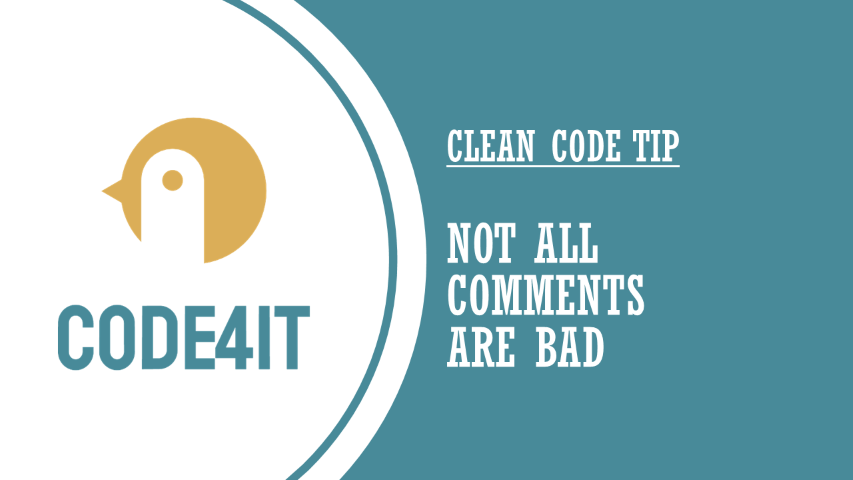Clean Code Tip: Not all comments are bad
Just a second! 🫷
If you are here, it means that you are a software developer. So, you know that storage, networking, and domain management have a cost .
If you want to support this blog, please ensure that you have disabled the adblocker for this site. I configured Google AdSense to show as few ADS as possible - I don't want to bother you with lots of ads, but I still need to add some to pay for the resources for my site.
Thank you for your understanding.
- Davide
Many developers say that
All comments are bad! 💢
False! Most of the comments are bad!
Examples of bad comments
For example, look at this method, and look at the comments:
/// <summary> Checks if the password is valid </summary>
/// <param name="password">The password to be validated</param>
/// <returns>True if the password is valid, false otherwise</returns>
public bool IsPasswordValid(string password)
{
Regex regex = new Regex(@"[a-z]{2,7}[1-9]{3,4}");
var hasMatch = regex.IsMatch(password);
return hasMatch;
}
Here the comments are pointless - they just tell the same things you can infer by looking at the method signature: this method checks if the input string is a valid password.
So, yes, those kinds of comments are totally meaningless, and they should be avoided.
Good types of comments
But still, there are cases when writing comments is pretty helpful.
public bool IsPasswordValid(string password)
{
// 2 to 7 lowercase chars followed by 3 or 4 numbers
// Valid: kejix173
// aoe193
// Invalid: a92881
Regex regex = new Regex(@"[a-z]{2,7}[1-9]{3,4}");
return regex.IsMatch(password);
}
Here the purpose of the comment is not to explain what the method does (it’s already pretty explicit), but it explains with examples the Regular Expression used to validate the password. Another way to explain it is by adding tests that validate some input strings. In this way, you make sure that the documentation (aka the tests) is always aligned with the production code.
By the way, for more complex calculations, adding comments explaining WHY (and not HOW or WHAT) a piece of code does is a good way to help developers understand the code.
Another reason to add comments is to explain why a specific piece of code exists: examples are legal regulations, related work items, or references to where you’ve found that particular solution.
Conclusion
Always pay attention when writing comments: yes, they often just clutter the code. But they can really add value to the code, in some cases.
To read more about good and bad comments, here’s a well-detailed article you might like:
🔗 Clean code tips - comments and formatting
Happy coding!
🐧


